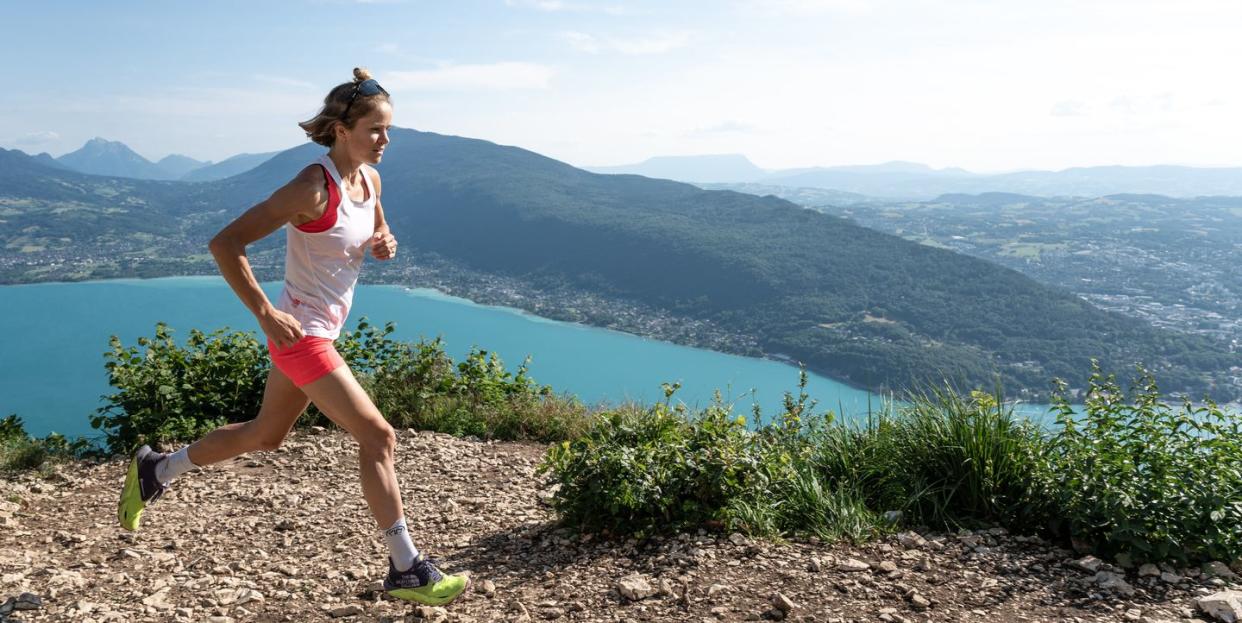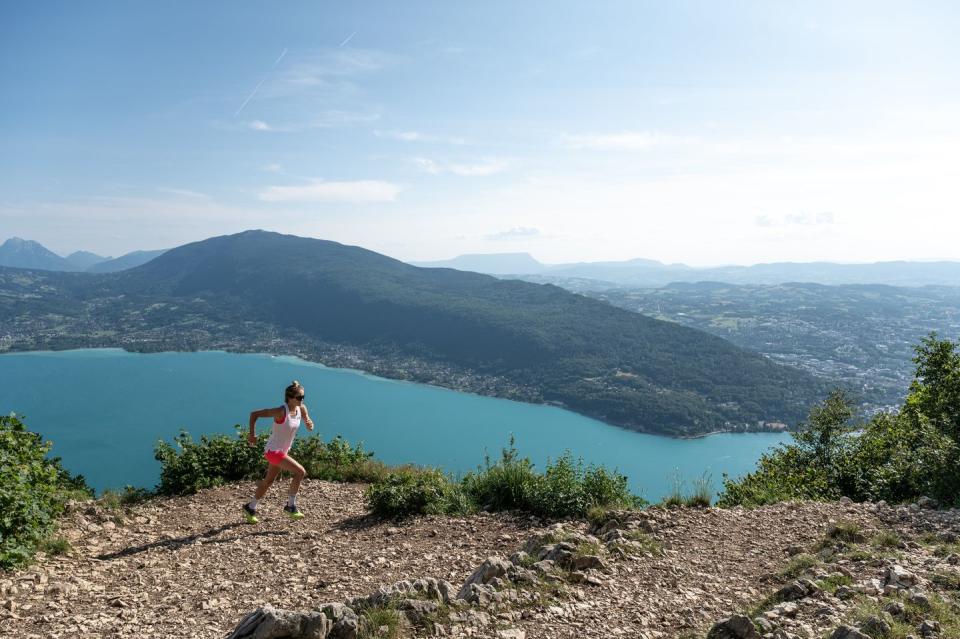Meet the GP who's switched road running for mountain trails

As the current record holder for the female Bob Graham mid-winter round, Elsey Davis is one of the most exciting names in the world of trail running.
With victories in the Scafell Marathon, Ultra Sierra Nevada and the Istria 100, and a personal best marathon time of 2:33:24 (Valencia, 2019), it’s fair to say that despite working as a doctor on the front line during the pandemic, her running career is still on the rise.
Sponsored by The North Face, the 34 year old Davis switched to the world of trail running after a series of injuries. ‘My body just doesn't like running on roads, essentially,’ she tells me. And after winning her first mountain race in 2021 – the 35K Eiger Ultra Trail, in Switzerland – she fell in love. ‘Grindelwald is just such a beautiful, magical place – I was like, “wow, this sport is crazy good”,’ she says.
‘Trail running wasn’t really a world that I was aware of. I just hadn’t really thought about it. I was obsessed with getting PBs, but it’s not really about that in the world of trails and ultras – it’s about running hard and seeing how you do.’
Davis’ speciality of mountain running – a type of trail running at a higher elevation, with demanding and technical terrain, and substantial elevation gain and loss – is still considered a fairly niche sport. But, like many competitive runners, Davis’ love for trails goes back to her childhood.
‘I started running at school,’ she explains. ‘I did cross country because I liked feeling like I was a part of something – but I wasn’t particularly good. Our school had a really great running team – we won the national title – but I didn’t ever think I’d have a career in running. I guess I thought, if I'm not fast at school, I’ll never be any good.’
Davis says that because she was never ‘the best’ at school, there was never any pressure on her to win. ‘I never dreamt I’d be a professional, or be paid to run – it still blows my mind now,’ she adds. ‘I thought I was too small and too scrawny. I saw Paula Radcliffe and thought, well, I don’t look like her, she’s got really long legs and I don’t. And then the best girl at school had really long legs too – so I just made these connections in my head and told myself running wasn’t for me.’
After stopping running at college – ‘it’s not the coolest thing to be a runner and it doesn’t go hand in hand when you then discover going out and drinking’ – she decided to jump straight in the deep end and do a marathon. ‘Marathon training got me on the straight and narrow,’ she says.
She completed her first marathon in 2012, aged 23, in ‘around 3:47,’ she says. ‘My addiction grew from there. I wanted to do more but in different countries. As I was doing them, year by year, I just started knocking minutes off my time and before I knew it, I ran under three hours without a coach.’
However when she did then get a coach in 2015, within a year she had run 2:42. ‘I started doing structured training programmes but it was a little bit too much too soon and I ended up injured. In between injuries, I would get good results, but it was 50/50 heartache and enjoyment' she recalls. 'It got to the point where I thought I’d just have to leave running because it was just causing too much disappointment.’
But it wasn’t just years of injury niggles that made her switch things up – the Covid-19 pandemic also had a part to play. While some of her competitors spent their days training for the Olympics, Davis spent her time helping those with coronavirus fight for their lives.
‘At the beginning of Covid, I was still very much immersed in the road running world and I was looking towards the Olympic trials, aiming for a spot at Toyko. I was training for the London Marathon, and I was in the best shape of my life – I was in shape to run under 2:30.' she remembers. 'But the race got cancelled and the world went into lockdown. So instead of running London, I was working on a Covid ward instead. Obviously, it was disappointing, but the longer Covid went on, the more perspective you got.’

Davis explains that she still trained during this period, but it was difficult to know how hard to push because races kept being cancelled: ‘I’d start retraining and think, “ok, maybe this race is going happen”, and then I actually ended up getting a stress fracture because I was all over the shop with my training and also working harder than I had before on the Covid wards,’ she explains. ‘I got my first GB selection in lockdown because the World Half Marathon Championships were going to go ahead, and that’s when I got the stress fracture. I was so disappointed. I think that was one of the things that almost broke me. It was everything I dreamed of – I’d finally got this selection, and then I was injured.’
Since then, she’s gone on to compete for Team GB multiple times, but it’s easy to see how the mindset of ‘I’m injury prone’ beat her down. ‘I still had it in the back of my mind that I’d do road running or do both trail and road, but as time has gone on, road running has just fallen by the wayside and I don't miss it in any shape, way or form,’ she admits. ‘The sense of fulfilment I get after a trail race is so much more for me. I’d get my road PB but tell myself I could run faster - you’re always comparing yourself. Whereas with trail running, even if I have a bad race, position-wise, I still appreciate that I travelled to this amazing place and ran this really cool course. It’s just a better experience for me – and I put more value on happiness rather than performance now.’
Of course, it wasn’t like she came into trail running with zero trail experience. ‘I remember being on training camp and Aly Dixon [GB Olympic marathoner and now coach] mentioned that I move really well on the trails. When I was out for a run with the road runners I realised that on the trail, I’d look behind me, and they’d be gone. I think because I grew up in Cornwall, running on the coastal paths, it naturally made me good at the technical stuff.’
Davis is currently on a year sabbatical from work – she has to return in August to finish her GP training, which she’ll stretch over the next 18 months. The idea is she’ll work three days a week – Tuesday through Thursday – and then still have the long weekends to go and compete.
But finding the balance between ultra marathon training and a medical career is no easy feat. ‘Now I’m no longer doing night shifts, that’ll help a lot. It’s just about planning your training week so that it’s heavier at the weekends and lighter on the days that you are working,’ she says. ‘Of course, you take the hit a little bit. But I learned from before – when I was working full-time and running 100 miles a week [she now runs 50 a week] – I’d just get burnt out and injured. Now I know it’s important to take the stress off yourself a little bit if you can’t fit in the training.’

This summer, Davis has 10 races in total - her season started with the Mont Blanc Marathon, in which she came 11th. ‘It’s different to marathon training because it’s so targeted. So the OCC [the 50k category race in the UTMB] isn’t really at the front of my mind. It’s not like you have an ‘A’ race – all of them are ‘A’ races. So I work on the next race in the calendar – I’ve pretty much got one every three weeks.’
Isn’t it harder to recover if you’re running these 30-55k races so frequently? ‘Some girls actually race every weekend,’ she says. ‘It’s easier to recover on the mountains because your body isn’t impacted in such a uniform way. You can recover so much quicker than just putting everything into one road marathon. It’s less like you’re hitting set times and splits and more like you’re listening to your body and running to feel, so I don’t think you redline as much – and the more you do, the stronger you get.’
In fact, as Davis goes through the mountain season, her body becomes more and more conditioned to running up and down hills. ‘I recover faster every time,’ she says. ‘The first few races of the seasons are actually the hardest. Because I’m just not conditioned to racing hard on the trail, it takes me about a week to recover. By the end of the season, I will wake up the next morning and I’ll be feeling really good. So it’s very different to road running – you can do more longer races back-to-back and can still perform well.’
For anyone considering dipping their toe into the world of ultra-marathon running, Davis says you should ignore your watch. ‘Look at the weekly time you spend road running and then translate that into trail running, because the miles aren’t equal. You don’t want to stick to your old routine because 10 miles can take you three hours on a trail depending on the elevation,’ she says.
‘Just stop looking at your watch and at your pace. When I got into trail running I couldn't believe the pace I was running. There is obviously a gradient-adjusted pace, but not all watches show you that. So you need to ignore your pace almost entirely and plan your training around length rather than distance – so you’re still out running for an hour or an hour and a half, but then slowly building in the elevation.’
Davis also suggests avoiding jumping in the deep end, and starting instead with something that’s just slightly longer than a marathon distance – like 50k. ‘I genuinely believe that you don’t have to run an ultra in your training to complete an ultra. You have the endurance from all your training that you have cumulated. I think you do more damage by trying to slog out really slow, long miles just for the sake of it,’ she explains, ‘I think practising fuelling is more important than practising miles. The winners of ultras are those who are best at fuelling and are mentally the strongest.’
Whether Davis has got her fuelling strategy nailed is yet to be determined, but after struggling with injuries and setbacks for so long, her mental strength is undeniable. With a calm, steely focus, it’s on the mountains, not the roads, that Davis finds herself fully present and in the moment – ready to tackle whatever mountain comes her way next.
You Might Also Like


